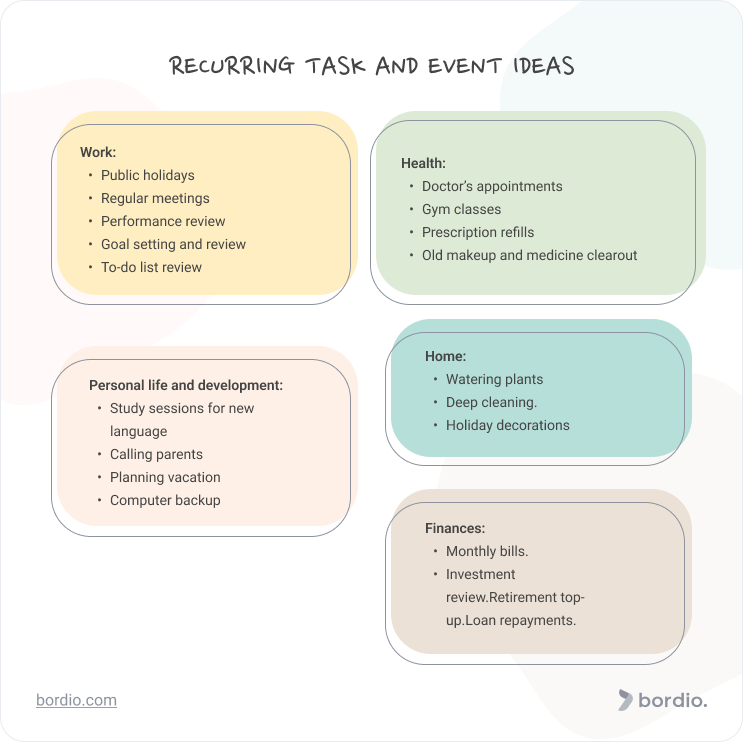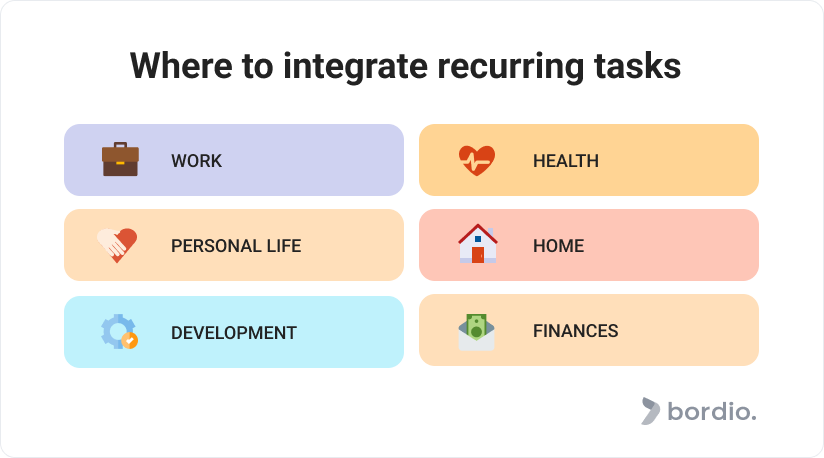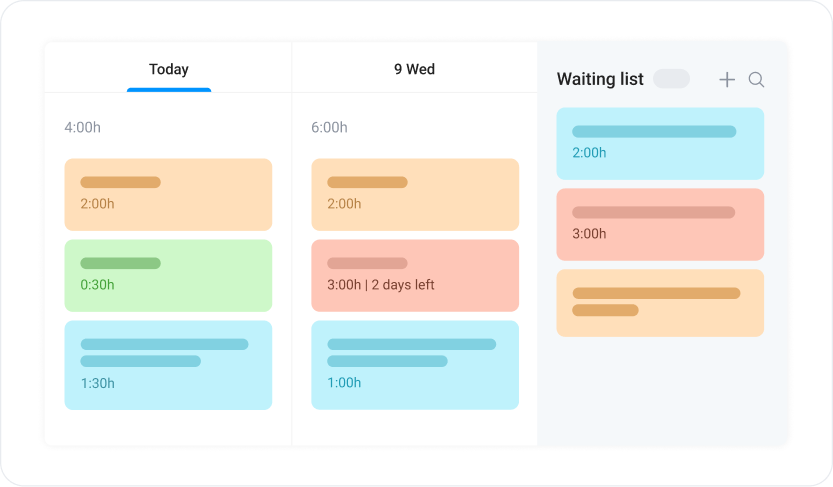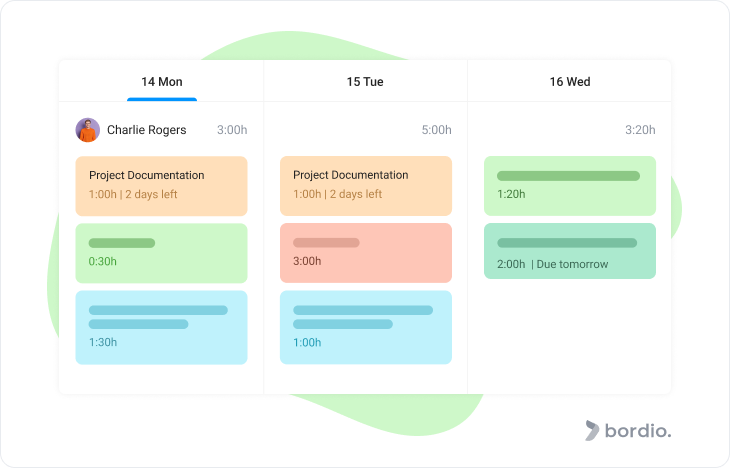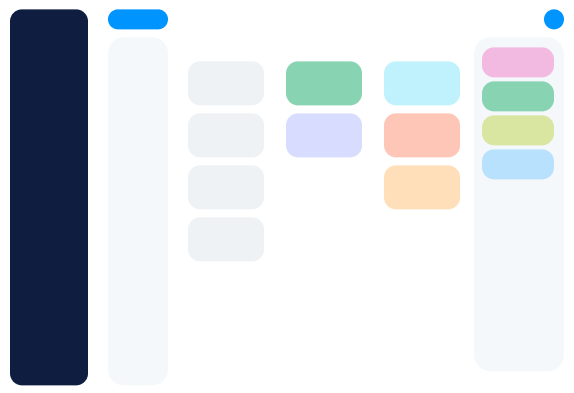Recurring tasks and events play an important role, as they ensure that a regular activity gets done and we get on with our days uninterrupted.
The question that often comes around productivity and planning is how we can make repeating events and tasks more efficient. There are a few tips that we will share with you today that will make your recurring tasks and events a bit more fun and less stressful. We are also providing a few examples of recurring tasks for inspiration.
What are recurring tasks and events and why you need them
Repeating, or recurring, tasks and events happen regularly on a scheduled basis. They can be daily, weekly, bi-weekly, monthly, or yearly.
Examples of recurring tasks:
- Grocery shopping for the week
- Visiting grandma
- Picking up kids from hockey class
All tasks and events that happen multiple times should be set on repeat. That way, you are guaranteed not to miss or forget about a separate task, and the job will be done.
Say you have a team meeting every week where 15 people come together to discuss progress with work. Imagine having to create a new event for this same meeting every week. And if you choose not to schedule it at all, you’d need to somehow remind everyone to join on a set time and date. It’s a lot of mess and wasted time. Instead, using software, such as Bordio, allows you to quickly set up a recurring event and keep it in everyone’s schedule.
The time we spend on admin and mundane recurring tasks is far more than we think it is. In fact, if you log your time for a week or two, you will be shocked at how little of your regular schedule is actually dedicated to value-generating activities.
Having repeating tasks and events scheduled not only saves you time but also avoids human errors that are common with manual labor. Any routine work benefits greatly from automation. It has to be done anyway, so why not do it faster and easier with some time management tricks?
Ideas for recurring tasks and events
Here are a few ideas for the next task repeats and events that you will be scheduling.
Some of them are perfect candidates to become a daily task for you. Others can be scheduled on a weekly or monthly basis. We’ve separated the tasks into different categories for your convenience.
Work-related recurring tasks examples
- Public holidays (yours and your international partners of clients).
- Regular meetings (weekly catch-up, monthly one-on-ones with your manager).
- Personal performance review (usually quarterly or annual, depending on your company’s policy).
- Quarterly goal-setting (best scheduled at the end of the previous quarter).
- End-of-quarter goal review (best scheduled at the beginning of the new quarter).
- Team building activities (e.g., once-a-quarter group sport activity).
- Weekly review of to-do and waiting lists (backlog).
- Salary discussion with the manager (usually happens every six months or once a year).
- Time block sessions to learn about the latest trends in the industry.
Personal life and development
- Study sessions to learn a new language.
- The weekly trip to one of the city museums.
- Call parents to catch up.
- Wish Happy Birthday to acquaintances and friends.
- Planning and booking vacations (where, when, doing what).
- PC backup (best combined with digital decluttering).
Health recurring tasks examples
- Doctor’s appointments.
- Gym classes and PT sessions.
- Prescription refills.
- Review and throw out expired medicine and makeup.
- Life insurance update.
Home
- Watering plants and flowers.
- Home deep clean session.
- Updating home insurance.
- Clean windows.
- Put up holiday decorations.
- Check smoke detectors.
Finances
- Paying monthly bills.
- Investment portfolio check.
- Retirement plan top-up.
- Transferring 10% of paycheck to savings.
- Loan repayments.
Daily recurring tasks and events for a healthier life
- Exercise and stretching.
- Eat fruit and vegetables with every meal.
- Drink water.
- Read a book.
- Meditate (10-15 minutes per day is enough).
- A short walk during lunch.
Bonus productivity tips for recurring tasks and events
Before we sign off, here are four tips to make the most of your recurring tasks and events.
#1 Switch to a single planning solution
As a start, take a look at all your productivity and planning gear – do you work with multiple notebooks, apps, and calendars? If the answer is yes, move to a single product and keep all your tasks and commitments there.
Ideally, get yourself a digital tool, such as Bordio, that you can update and check on the go anywhere.
#2 Customize notifications
One of the reasons we keep missing deadlines and not finishing recurring tasks is that we forget about them until it’s too late. The best way to avoid that is to customize your event and task notifications and have the system notify you well in advance.
For example, if you are a project manager and have the same task of a monthly meeting where you report to the stakeholders on the progress of the project, you won’t benefit from a notification popping up 20 minutes prior. That simply wouldn’t be enough time to prepare. Instead, schedule the reminder for that recurring task for 24 hours earlier and have time to review reports, have a look at the numbers, talk to the team, and draw interim conclusions.
#3 Use time blocks
Another great way to tackle repeating tasks and events is by assigning time blocks to them.
Say you have a recurring task of documenting the progress of the project. Ans say you know it takes you about 2 hours to complete. Because documentation is not usually high on our priority list, you tend to forget about it and quickly write something last minute for half an hour.
With Bordio’s calendar view, you can schedule time blocks for this or any other repeating task you need. For example, you can have one time block for 2 hours, or do two time blocks for one hour each. Choose the time and date of the time blocks, and voilà! This time will be reserved to work exclusively on your recurring task.
Create a new recurring task or click Recurring Task that’s already in the system, choose Add Time Block, and set the length in the duration box. You can have as many time blocks as you’d like, and you won’t be able to complete the task without completing the time blocks first.
#4 Read about productivity and time management
We often think that we know everything and that productivity books or time management books won’t teach us anything new. It is not completely true though. The more you read and practice, the better chance you have to alter your behavior and habits.

